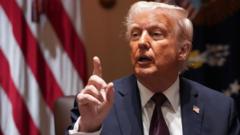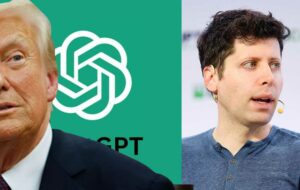Germany's defiance against US tariffs sparks global trade tension as countries express concerns over economic impact.
Trump's 25% Tariffs on Car Imports Ignite Global Trade Tensions

Trump's 25% Tariffs on Car Imports Ignite Global Trade Tensions
Germany and other countries vow retaliation against US auto tariffs, escalating trade disputes.
Germany has firmly asserted its stance against the recent announcement by US President Donald Trump, who has imposed a 25% tariff on imported cars and auto parts. The response from Germany is clear: "We will not give in," announced German Economy Minister Robert Habeck, emphasizing Europe’s need to "respond firmly" to these aggressive trade measures.
The tariffs threaten to ignite a trade war, eliciting swift condemnation and pledges of retaliatory action from major economies around the globe. France characterized the tariffs as "very bad news," while Canadian Prime Minister Mark Carney labeled the move a "direct attack" on his nation’s automotive industry. Similarly, China has criticized the move as a violation of international trade regulations.
As the markets reacted negatively, shares of prominent automobile manufacturers such as Porsche, Mercedes, and BMW saw significant declines. Trump’s tariffs, effective from April 2 for imported vehicles and potentially later for parts, are part of his broader agenda to bolster American manufacturing by making foreign cars more expensive in the US market. Currently, the United States imports around eight million cars annually, valued at approximately $240 billion, with Mexico leading as the primary supplier.
While the tariffs may shield American manufacturers, there are concerns about the ripple effects on domestic companies reliant on imported parts. Estimates suggest that tariffs on parts alone could escalate production costs for consumers by thousands of dollars.
Robert Habeck further stressed that the EU must showcase resilience against US pressures, with France’s finance minister Eric Lombard echoing the need for a united front through retaliatory tariffs on American products. "We must rebalance the playing field," Lombard underscored.
Amidst this turmoil, responses have emerged from other nations, including Japan, where officials expressed disappointment and requested exemptions from these new tariffs. In South Korea, Hyundai announced a significant investment to open a new steel plant in Louisiana, a move Trump hailed as proof that his tariff policies are effective.
In Germany, Bosch expressed its commitment to the North American market despite the shifting landscape, showcasing the broader implications of the tariffs on global trade dynamics. The move has ramped up tensions, making the future of international trade agreements uncertain, reigniting debates about the consequences of such economic battles.





















